Search Results for Tag: hertie school
Germany’s energy transition “biggest challenge since World War II”
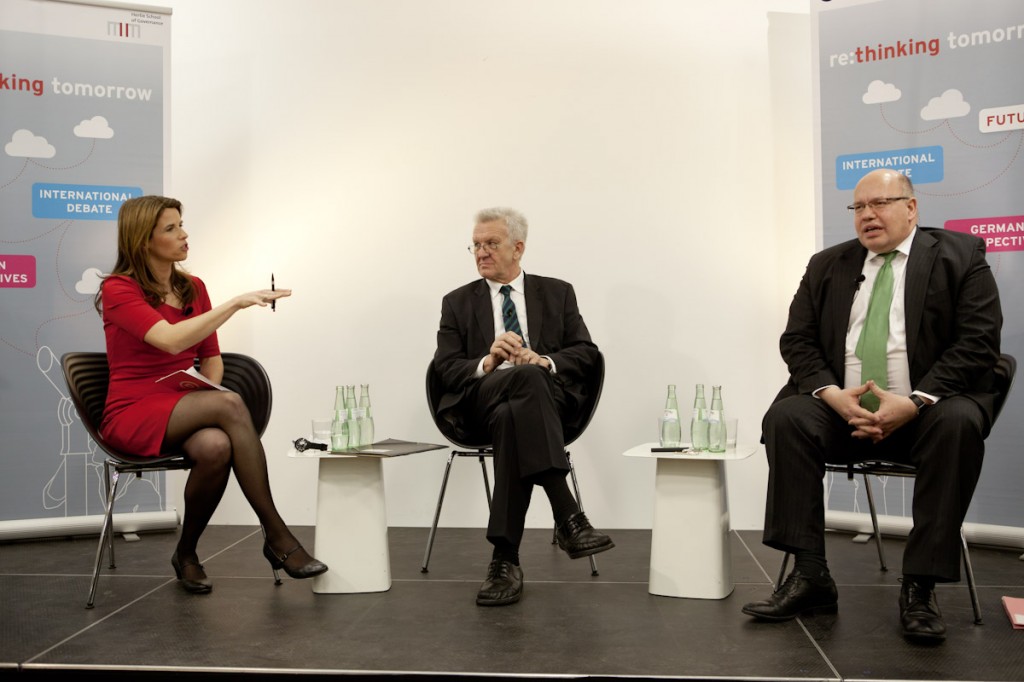
How much should Germany’s “Energiewende,” a move towards ramping up renewable energy, cost? That question was the main sticking point at a lively debate on Wednesday between German Environment Minister Peter Altmaier (a member of the governing Christian Democratic Party) and the Green Party’s first state premier in Baden-Württemberg, Winfried Kretschmann. The discussion at the Hertie School of Governance was part of an ongoing series of events called “Re:Thinking Tomorrow.” The events are co-organized by Deutsche Welle, which is also a media partner.
The energy transition which involves phasing out nuclear and fossil fuels has sparked huge international interest and remains a hot-button issue in the country. In an interview with Global Ideas, Environment Minister Peter Altmaier said the transformation of Germany’s energy system “is the biggest challenge since the Second World War.” “It means a complete transformation of the backbone of Germany’s economy and business,” he added.
Altmaier went on to speak about the technical and financial challenges in scaling up renewables and phasing out nuclear energy as well as how Germany can build on its reputation as a pioneering power in green issues.
All about the German energy turnaround (Energiewende) – statement Peter Altmaier @ Hertie School from DW_Global Ideas on Vimeo.
Both Altmaier and Kretschmann are considered political heavyweights when it comes to climate and environmental issues, which made for some amusing and lively verbal exchanges. Kretschmann began by accusing Altmaier of unsettling voters. “People already mix up millions and billions,” he said, adding “and now you are talking about trillions!” That elicited quite a few laughs from the audience. A few weeks ago, Altmaier had said Germany’s energy transition would cost energy consumers up to one trillion Euros if certain measures weren’t taken such as putting brakes on electricity prices.
Both participants agreed that Germany’s energy transition has to be an ecological and economic success if it is to find wide acceptance both within Germany and beyond. Germany may only be responsible for three percent of the world’s CO2 emissions, they argued. But if it managed to successfully pull off its ambitious energy transition project and move towards a low-carbon economy, it could offer vital lessons for big polluters such as China. That’s why, they stressed, it remains important not to jeopardize the energy project.
Kretschmann said the energy transition had already led to green growth with jobs and opportunities generated in the renewables sector. To keep things this way, Environment Minister Altmaier said brakes had to be put on electricity prices. The turnaround has to stay affordable for everyone, he added.
Kretschmann underlined the positive effects of the energy turnaround in the future. In the long run, consumers will pay less for electricity, Kretschmann argued, saying “the sun, after all, doesn’t send you any bills.”
Students discuss the German “Energiewende” 5/5
Today, international students from the Hertie School in Berlin will be participating in a discussion forum with German Environment Minister Peter Altmaier and Winfried Kretschmann, the Green Party’s first state premier in Baden-Württemberg. The debate will focus on Germany’s “Energiewende,” literally an energy turnaround involving ambitious plans to phase out nuclear power and boost renewable energy.
Also today, we’ll be introducing the students taking part in the debate. Karina Campos from Argentina is our last candidate.
Karina Campos, Argentina from DW_Global Ideas on Vimeo.
Students vs. Environment Minister Altmaier – twitterview on Global Ideas
Germany’s energy turnaround, the so called “Energiewende,” is a hotly-debated issue in the country. It’s way too expensive for Germany to wean itself off nuclear energy and fossil fuels and boost renewables, say some. Others argue it’s a Herculean task, impossible to translate into reality.
But who else if not Germany would be able to pull it off? Given its track record in green issues, Germany could become a role model and not only for other industrialized nations. So does the planned “Energiewende” stand a real chance at being successful? The debate was further fueled after German Environment Minister Peter Altmaier said the project will cost 1 trillion Euros until the end of the 2030s. What he did not say was how exactly he arrived at this impressive number. His statement prompted huge criticism and heated debate among energy experts.
Amid this backdrop, Global Ideas held a twitterview ahead of a discussion forum at the Berlin-based Hertie School of Governance. Students from all over the world had the chance to direct their questions online at Minister Altmaier.
On Wednesday, Altmaier will be on the panel together with Winfried Kretschmann, the Green Party’s first state premier in Baden-Württemberg. The two are set to discuss pressing issues surrounding the “Energiewende” with the Hertie students. The twitterview offered a taste of what’s to come.
@timbales asked about the opportunities to reduce the costs of the “Energiewende.”
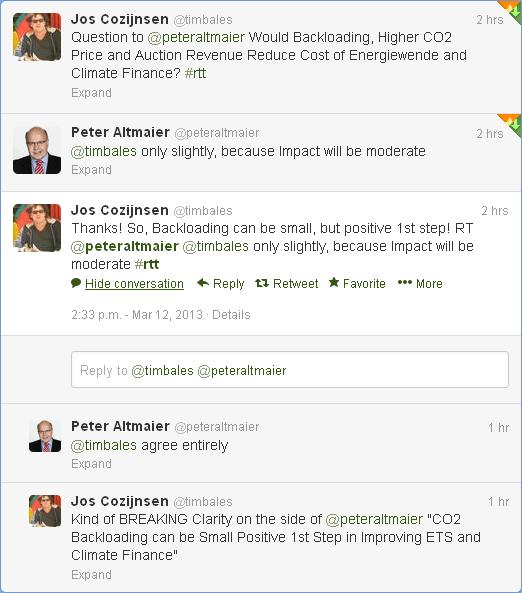
Another question by @markre referred to the role of the opposition ecologically-minded German Green Party in the energy transition process. Altmaier said the Green Party had played an important role in the process in the beginning:
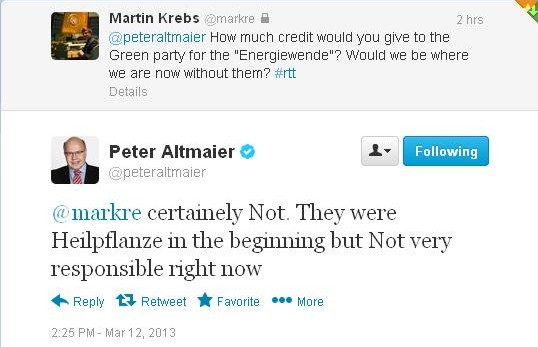
Another question by @markre was if the “Energiewende” could be an insurance against rising prices. It certainly is, Altmeier said, but in the long run.
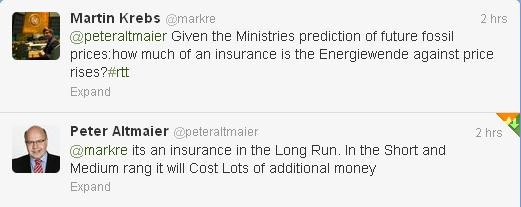
There was also a discussion in German about the upcoming federal elections in September this year. @alexzirkel wanted to know if there is a need for an “Energy minister.” A position focused exclusively on energy issues is currently not foreseen in the German parliament. The Twitter user also wanted to know who would be the best man for the job. Interestingly, neither of the two politicans in the Twitter discussion rubbished the idea of an exclusive ministry for energy issues. We’ll have to wait and see what happens after the election.
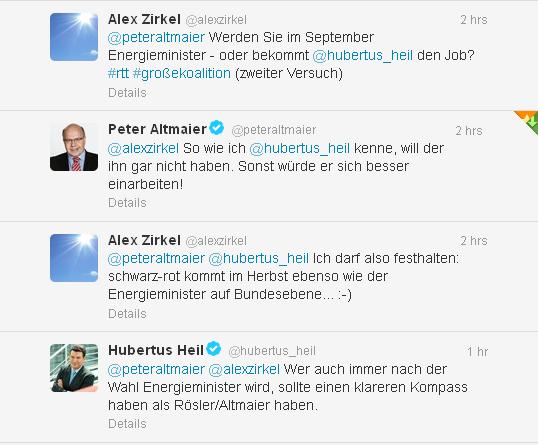
If you want to get more details on the “Energiewende,” you’ll find an overview as well as insights and background information on the Deutsche Welle website.
Students discuss the German “Energiewende” 4/5
Tomorrow, international students from the Hertie School in Berlin will be participating in a discussion forum with German Environment Minister Peter Altmaier and Winfried Kretschmann, the Green Party’s first state premier in Baden-Württemberg. The debate will focus on Germany’s “Energiewende,” literally an energy turnaround involving ambitious plans to phase out nuclear power and boost renewable energy. Until tomorrow, we’ll be introducing the students taking part in the debate. Today: Harrison Epstein from the United States.
Harrison Epstein, USA from DW_Global Ideas on Vimeo.
Students discuss the German “Energiewende” 3/5
In a few days, international students from the Hertie School in Berlin will be participating in a discussion forum with German Environment Minister Peter Altmaier and Winfried Kretschmann, the Green Party’s first state premier in Baden-Württemberg. The debate will focus on Germany’s “Energiewende,” literally an energy turnaround involving ambitious plans to phase out nuclear power and boost renewable energy.
Until March 13, we’ll be introducing the students taking part in the debate. Today: Felicitas Schuldes from Germany.








Feedback